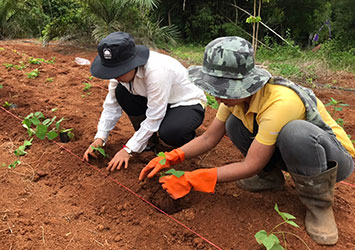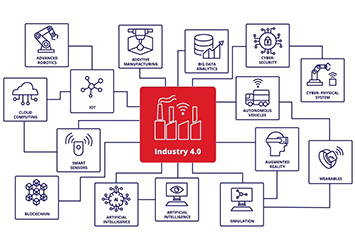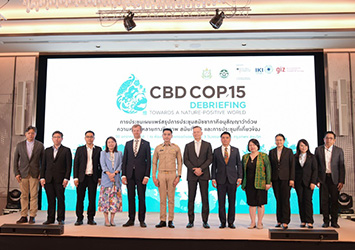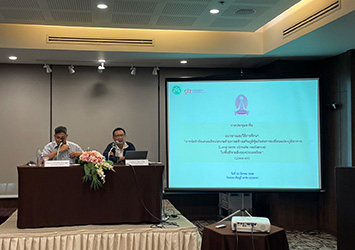 | |
 | |
Dear readers,
Welcome to the GIZ Thailand newsletter for January through April 2023. As ever, several fascinating articles from our projects in collaboration with our partners in Thailand are included in this edition.
Starting with agriculture and food, policymakers and government executives from Germany and Thailand recently visited the Thai Rice NAMA project site in Suphanburi province. Other noteworthy events included the signing of an MOU on the utilisation of rice straw in Chiang Rai, a successful collaboration on the use of electronic phytosanitary certificates (ePhyto), the launch of the Innovative Climate Risk Financing for the Agricultural Sector in the ASEAN Region Project (AgriCRF), and the Coffee++ project in Thailand. Moreover, this issue features captivating articles about increasing productivity and income from managing coconut plantations with sustainable organic farming methods, sustainable and environmentally friendly oil palm production based on the BCG model, and helpful tips from the Sustainable Palm Oil Production and Procurement Project (SPOPP) trainers.
The summer in Thailand this year has been particularly long due to the effect of El Niño and no one has escaped the rising temperatures. The energy cluster therefore organised a fun educational event called "Energine: Jointly Imagine to Promote Sustainable Energy for Our Lives and the Planet" to promote sustainable energy transition in Thailand and provide useful tips on how to save energy amidst climate change. The climate change policy cluster has also prepared to set up Thailand's first climate funding project. Other interesting articles on climate change and biodiversity in marine and coastal areas, and the launch of online learning courses for vocational personnel are also featured.
Those interested in developing their knowledge in various fields should be sure to keep track of information and courses from the Academy for International Cooperation (AIZ) at https://www.learning-giz.de
For regular updates on GIZ’s projects and activities, please visit us at: Website and Facebook, as well as our Twitter and LinkedIn.
Best regards,
GIZ Thailand newsletter team |
| |
|
|
|
 | |
| |
|
|
| |
| |
| |
 |
| |
| Thailand successfully establishes ePhyto certificates for exporting and importing plants and plant products |
| |
| ● |
Department of Agriculture, National Bureau of Agricultural Commodity and Food Standards, and Thai Customs Department gear up to promote trade facilitation and close ranks in dealing with the export and import of plants and plant products |
| ● |
The use of electronic phytosanitary certificates reflects the commitment and efforts by the Thai government to facilitate and simplify the process involved in exports by moving from a paper-based process |
| ● |
Over 392,532 phytosanitary certificates have been issued annually on average between 2020-2023 to export plants and plants products to ASEAN and other international markets. Full application of ePhyto can potentially reduce transport and operator costs by up to 166 million baht or 4.89 million US dollars per year. |
|
| |
|
|
|
|
 |
| |
GIZ and Urmatt collaborate on the project "Utilising Rice Straw for Smallholder Rice Farmers"
|
| |
| ● |
GIZ and Urmatt Ltd joined forces for a collaborative project aimed at reducing rice straw burning by smallholder rice farmers in the northern province of Chiang Rai through the innovative use of rice straw. |
| ● |
Without feasible management methods, farmers often resort to burning rice straw and stubble in the field to clear the land despite the health and pollution risks involved. Burning rice straw also causes significant greenhouse gas emissions that contribute to climate change. |
| ● |
This joint collaboration also emphasises a further implementation step following the extended framework of Inclusive Sustainable Rice Landscapes in Thailand aimed at transforming the Thai rice value chain for environmental sustainability.
|
|
| |
|
|
|
|
|
|
| |
|
 |
| |
| |
 |
| |
The Coffee++ project in Thailand has been launched
|
| |
| ● |
GIZ and Nestle launched the project “Transforming livelihoods and climate resilience of smallholder coffee producers through the adoption of regenerative agriculture production systems (Coffee++)” in 2022, following the success of the previous project “Improving coffee smallholder coffee farming systems in Southeast Asia (Coffee+)” started in 2018. |
| ● |
Coffee++ aims to support smallholder farmers’ economic livelihoods, create better social conditions, and address climate change in selected coffee areas in Thailand, the Philippines, Indonesia and Côte d’Ivoire, through the adoption of regenerative agricultural farming practices.
|
|
| |
|
|
|
|
 |
| |
Innovative climate-risk finance project launched in Thailand
|
| |
| ● |
GIZ has introduced the Innovative Climate Risk Financing for the Agricultural Sector in the ASEAN Region Project (AgriCRF) for upscaling ASEAN farmers’ access to financial tools essential for enhancing climate resilience and gender response in the agricultural sector. |
| ● |
Commissioned by the German Federal Ministry for Economic Cooperation and Development, this three-year project will be implemented at the regional level through the Food, Agriculture and Forestry Division of the ASEAN Secretariat, ASEAN Sectoral Working Group on Crops, and at the national level in Indonesia, Thailand and Vietnam. It runs from January 2023 to December 2025. |
|
| |
|
|
|
|
|
|
| |
|
| |
| |
 |
| |
| SPOPP Trainers: a role model beyond teaching and sharing knowledge |
| |
| ● |
In the Sustainable Palm Oil Production and Procurement Project (SPOPP), our trainers are more than just regular trainers but also serve as training instructors, training facilitators, as well as technical inspectors tracking the farmer’s adoption of knowledge once the training has been completed. |
| ● |
They also play a crucial role in driving oil palm farmers to reach their goals towards achieving the Roundtable on Sustainable Palm Oil (RSPO) Standard and Certification. |
| ● |
We have gathered useful tips to take into account when working with farmer communities.
|
|
| |
|
|
|
|
 |
| |
| Environmentally friendly oil palm production with BCG model |
| |
| ● |
Agriculture is not only focused on production efficiency. The environmental impact of production should also not be overlooked. |
| ● |
Many countries are now focusing on economic development with sustainability in mind. This can be seen in the UN’s SDGs and Thailand’s BCG (Bio-Circular-Green Economy) Model. |
| ● |
The Department of Agriculture has collaborated with GIZ to develop knowledge on oil palm production with smallholder farmers to raise the level of sustainable palm oil and palm oil production to international standards and elevate the quality of life of smallholder farmers. |
|
|
|
|
|
|
|
|
| |
 |
| |
| |
 |
| |
| “CAP SEA” successfully completed in Thailand and Malaysia |
| |
| ● |
The CAP SEA project ran from May 2020 to March 2023 to support Malaysia, Thailand and Indonesia in preventing and reducing single-use plastics and packaging waste. |
| ● |
Through policy advice, pilot initiatives and collaboration with businesses, CAP SEA aided in the development of policies, industry standards and the execution of single-use plastic action plans. |
|
| |
|
|
|
|
 |
| |
“Learning highlights” to enhance TVET personnel knowledge
|
| |
| ● |
"Learning Highlights" are standalone units extracted from "Fit for Industry 4.0" In-Service Training Modules. |
| ● |
The series covers various topics related to digitalisation and Industry 4.0 and is designed to be efficient for an appropriate period of time. |
| ● |
Accessible anytime, anywhere and free of charge on the SEA-VET.net THINKIFIC Learning Platform
|
|
| |
|
|
|
|
|
|
| |
|
 |
| |
| |
 |
| |
| Reflecting on the outcomes of CBD COP15 and kicking off Thailand´s new biodiversity framework |
| |
| ● |
A CBD COP15 debriefing event hosted by ONEP was organised to inform stakeholders in Thailand of the outcome of the negotiations in Montréal and the new Kunming-Montreal Global Biodiversity framework, as well as the road forward for Thailand |
| ● |
In the event, ONEP also emphasised that Thailand joined the High Ambition Coalition (HAC) and set its eyes on the 30x30 target which is in line with the interests of several international organisations
|
|
| |
|
|
|
|
 |
| |
| Verifying the known and unknown: Experts discuss climate pressures in Thailand’s marine and coastal areas |
| |
| ● |
As part of the preparation feeding into further comprehensive adaptation work within the country, the meeting invited experts to verify known existing climate pressure on the marine and coastal sector. |
| ● |
The process takes into account known and observed changes due to anthropogenic climate change in different areas of the country and at different scales. |
| ● |
The results showed some explainable change in line with global trends as well as some external factors that might be causing the changes. |
|
| |
|
|
|
|
|
|
| |
|
| |
|
|
|